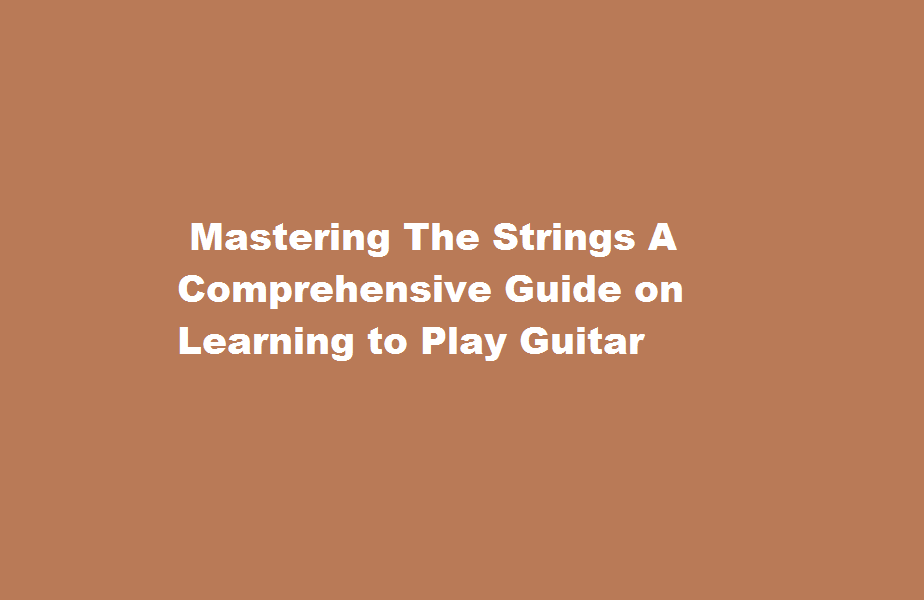Mastering The Strings A Comprehensive Guide on Learning to Play Guitar
4 min read
Introduction
Learning to play the guitar is an exciting and fulfilling journey that opens up a world of musical possibilities. Whether you’re a beginner or someone looking to brush up on their skills, this article aims to provide a comprehensive guide to help you navigate the path to guitar mastery. By following these steps and adopting the right mindset, you’ll be well on your way to becoming a confident and proficient guitarist.
Choosing the Right Guitar
Before diving into the world of guitar playing, it’s crucial to choose the right instrument that suits your preferences and playing style. There are various types of guitars available, such as acoustic, electric, and classical guitars. Each type has its unique characteristics, so it’s essential to try them out and find the one that resonates with you. Consider factors like the sound you want to achieve, comfort, and budget when making your decision.
Setting Goals and Creating a Practice Routine
Establishing clear goals and creating a practice routine are fundamental aspects of effective guitar learning. Determine what you want to achieve, whether it’s learning specific songs, improving your fingerpicking technique, or understanding music theory. Break down your goals into smaller, manageable tasks, and allocate regular practice sessions in your schedule. Consistency and discipline are key to progress, so set aside dedicated time each day or week to practise.
Learning Basic Chords and Strumming Patterns
Acquiring a solid foundation in chords and strumming patterns is essential for every guitarist. Start by learning basic open chords, such as C, D, G, E, and A. Practice transitioning between chords smoothly and accurately. As you gain proficiency, explore more advanced chord voicings and barre chords. In addition to chords, develop your strumming technique by practising various patterns and rhythms. This will enhance your sense of timing and groove, allowing you to play a wide range of songs.
Understanding Music Theory
While not mandatory, having a grasp of music theory can significantly enhance your guitar playing skills. Familiarise yourself with concepts like scales, intervals, and chord progressions. This knowledge will enable you to understand how songs are constructed and improvise with confidence. Study the relationship between notes on the fretboard and learn to read guitar tablature and sheet music. Online resources, books, and tutorials can help you dive deeper into music theory.
Expanding Your Repertoire and Seeking Inspiration
Building a diverse repertoire of songs is an excellent way to apply and reinforce your guitar skills. Choose songs from different genres and difficulty levels to challenge yourself and expand your musical horizons. Explore various playing styles, such as fingerstyle, blues, rock, or classical, and learn from guitarists you admire. YouTube tutorials, online courses, and guitar tabs are valuable resources for learning new songs. Additionally, attending concerts and jamming with fellow musicians can provide inspiration and motivation to continue improving.
Frequently Asked Questions
What is the secret to guitar?
Consistent practice and repetition of different notes and chords can help you develop your ear, learning to correctly identify notes and patterns in your playing. Learning to play guitar becomes much easier when you are able to pick out which notes are in a song, what key that song is in, and what chords are involved.
What is the first lesson to learn guitar?
Open chords are one of the first skills a beginner guitarist will learn. Master just three, and you can play a whole host of popular songs. Aside from attending guitar lessons, following a chord chart is one of the best ways to get acquainted with the basics. Check out this chord chart as a place to start.
Conclusion
Learning to play the guitar requires dedication, patience, and consistent practice. By selecting the right instrument, setting clear goals, and following a structured practice routine, you’ll steadily progress on your guitar journey. Remember to focus on foundational skills like chords, strumming, and music theory, while also expanding your repertoire and seeking inspiration from experienced guitarists. Embrace the joy of playing the guitar and enjoy the rewards of expressing yourself through this beautiful instrument.
Read Also : Discover The Artistic Journey Learning Painting from Scratch





